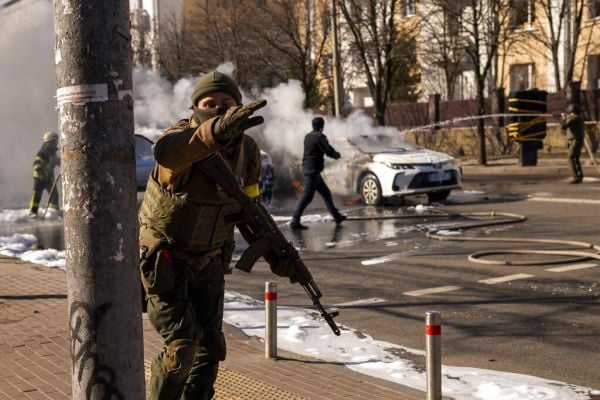“It seems like being an Israeli in Kyiv these days, is being on the right side of the conflict.”
By Pesach Benson, United With Israel
After weekend of fighting, Russian and Ukrainian delegations will meet along the Ukraine’s border with Belarus.
Four days into the invasion, Ukrainians have held up Russian forces from reaching Kyiv. Fierce fighting is reported in Kharkiv, Ukraine’s second largest city. President Vladimir Putin put his nuclear forces put on high alert following what he called “aggressive statements” by NATO countries and Western sanctions.
Israel and the Jewish world are closely watching the unfolding events. There is concern for the fate of thousands of Ukrainian Jews and Israeli nationals still in Ukraine, as well as the war’s unfolding strategic implications.
Here’s a quick hit look at the Jewish news you need to know about the war and its fallout.
• Ynet reporter Ron Ben-Yishai reporting in Ukraine had a tense moment on the outskirts of Kyiv when Ukrainian soldiers mistakenly suspected him and his guide of being Russian spies. The situation was defused when the soldiers saw his Israeli passport and press credentials.
Ben-Yishai’s money quote: “It seems like being an Israeli in Kyiv these days, is being on the right side of the conflict. The Ukrainians simply equate our continuous war with the Palestinians and our stand against our enemies, with their surprisingly determined fight against the Russians.”
• Although Iran banned demonstrations against Russia’s invasion, a group of Iranians gathered outside the Ukrainian embassy in Tehran. It wasn’t possible to determine the size of the crowd from videos posted on Twitter, but protesters chanted “Death to Putin,” “Long live Ukraine,” and “Long live peace.”
• In a Sunday phone call with Putin, Israeli Prime Minister Naftali Bennett offered to serve an intermediary between Russia and Ukraine. A Kremlin readout of their conversation confirmed Bennett’s offer but didn’t indicate Putin’s response. Subsequent reports said the Russian president declined the offer.
• Ukrainian and Russian Birthright groups are sheltering in Israel.
• The Ministry of Foreign Affairs confirmed that while evacuating 100 Arab Israeli students from Khakhiv, it also helped an unspecified number of Arab students from other countries that don’t have diplomatic relations with Israel.
According to the Jerusalem Post, the Arab Israelis asked to bring their friends, who were from Syria, Lebanon, Egypt as well as Palestinians living in eastern Jerusalem. The Post reported that when the students reached Moldova, Israeli officials could only help their own citizens cross the border.
• The crisis has forced Israel and Poland boost ties that were strained last year. Israel recalled its ambassador in Warsaw in protest against contentious Polish legislation sharply restricting restitution claims from Holocaust survivors and their families.
Yacov Livne, Israel’s designated ambassador to Poland was dispatched to Poland to “enhance assistance to Israeli citizens crossing the border from Ukraine to Poland, and in view of the importance of events and the central role Poland is playing in them,” a Foreign Ministry statement said.
• Ukrainians are bitterly experiencing what Israelis learned the hard way: The UN is incapable of maintaining peace and security.
• Knesset speaker Mickey Levy became only the second top Israeli official to explicitly condemn Russia’s attack. Levy’s remarks came in a solidarity phone call to his Ukrainian counterpart, Ruslan Stefanchuk.
• Ahead of Sunday’s cabinet meeting, Bennett said Israel will send 100 tons of humanitarian aid, including medicine and medical supplies, tents, blankets, water purification kits.
• The Jewish Agency announced it is opening aliyah stations at Ukrainian border crossings with Poland, Hungary, Moldova and Romania.
• The heads of several Israeli institutions sent a letter to President Joe Biden calling him not to include Israeli-Russian billionaire Roman Abramovich on a list of Russian oligarchs to be targeted with sanctions.
The letter–signed by Yad Vashem chairman Dani Dayan, Chief Rabbi Dovid Lau and other notables — cited Abramovich’s philanthropy and said that sanctions on him would have a negative impact on the Jewish world.
• Because of the danger to life, Ukrainian rabbis instructed Jews remain told remain in their homes over Shabbat and to leave their cellular phones on — or even radios, according to the Jewish News Service.
Hebrew media also reported that 200 Jews from Odessa were making their way to Poland during Shabbat in several busses after not having the necessary papers to enter Moldova. Ukrainian Rabbi Aaron Motuz told the Israeli news site Kikar that the urgency relates to a government order forbidding men over the age of 18 from leaving the country.
• A Facebook message posted on Saturday by the Ukrainian embassy in Tel Aviv was actively recruiting Israelis to join the fight before being removed later that day. According to the Times of Israel, it’s illegal for Israelis to join a foreign army unless Israel has an agreement with that country.
But in what appears to be an odd loophole, it is technically permissible for foreign governments to recruit Israelis.
• From Jewish Comedian to Wartime Leader: Volodymyr Zelensky’s Unlikely Journey
• The Ministry of Foreign Affairs instructed its diplomatic staff in Lviv to spend their nights on the Polish side of the border and return to the Ukrainian side each day. Israelis coming to border crossings are asked to mark their coats with the letters IL so they can be quickly spotted.
• Israel declined to co-sponsor a Security Council resolution condemning Russia on Friday. 81 other countries co-sponsored the resolution. The resolution was vetoed by Russia. Underscoring Moscow’s isolation, the resolution was supported by 11 of the council’s 15 members. China,India and the UAE abstained. Russia is currently president of the Security Council, meaning it presided over the meeting.
• The PA is keeping silent on the war in Ukraine. The Jerusalem Post explains that Palestinian Authority President Mahmoud Abbas still holds out hope for an international conference on the Middle East conflict — with Russian participation — to force Israeli concessions.

